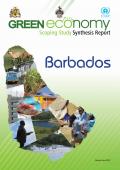
This synthesis report focused on five key sectors (agriculture, fisheries, building, transportation and tourism) in Barbados to scope the transition to a green economy on the island. In particular, the study focuses on the applicability of the accepted UNEP definition of green economy to Small Islands Developing States, of which Barbados is one.
Barbados is vulnerable to both fluctuations in the price of its imported fossil fuels and at risk from the destruction of its marine and coastal ecosystems from climate change therefore the report states that the pursuit of a greener path to economic development is highly attractive to the country.

This paper describes how International Labour Standards could be made more relevant to climate change in terms of its impact on employment and the labour market. It addresses the transition to a low carbon economy through a framework of policy coherence and good governance using International Labour Standards as guidelines for supporting not only the social dimension of sustainable development, but the economic and environmental ones as well.
Quoting a joint analysis undertaken by the OECD and the IEA, G-20 leaders committed in September 2009 to "rationalize and phase out over the medium term inefficient fossil-fuel subsidies that encourage wasteful consumption." This report draws on previous OECD work to assess the impact on international trade of phasing out fossil-fuel consumption subsidies provided mainly by developing and emerging economies. The analysis employed the OECD’s ENV-Linkages General-Equilibrium model and used the IEA’s estimates of consumer subsidies, which measure the gap existing between the domestic prices of fossil fuels and an international reference benchmark. It shows that a co-ordinated multilateral removal of fossil-fuel consumption subsidies over the 2013-2020 period would increase global trade volumes by a very small amount (0.1%) by 2020. While seemingly negligible, this increase hides the large disparities that are observed across countries (or regions) and products. Under the central scenario, which assumes a multilateral subsidy removal over the 2013-2020 period, trade in natural gas would be most affected, with a 6% decrease by 2020.
This brief examines the reasons behind the current drive towards sustainable public procurement (SPP), and the barriers that have to be overcome in order to implement it. It also looks at the key benefits and methods involved in SPP and green public procurement (GPP). The author explains that a significant share of the world’s GDP is associated with expenditures by governments. On average, total public expenditures by central and local governments are estimated to account for about 20% of GDP in OECD countries, and roughly 15% in non-OECD countries.
Governments have increasingly become involved in making their procurement “greener” or more sustainable. While green procurement and sustainable procurement refer to different concepts, the underlying idea is the same: to use public procurement in order to achieve desirable environmental and, in the case of sustainable public procurement, social outcomes.
Reasons for engaging in GPP or SPP include:
Electric vehicles are a potentially significant route towards low-carbon transport but widespread adoption of e-mobility will lead to greater consumption of electricity. Existing electricity systems will need to be reconfigured to meet these needs if reliance on fossil fuels is not to increase. In a paper looking at the potential of Smart Grids and electric vehicles to change and improve electricity systems worldwide, the International Transport Forum found that:
